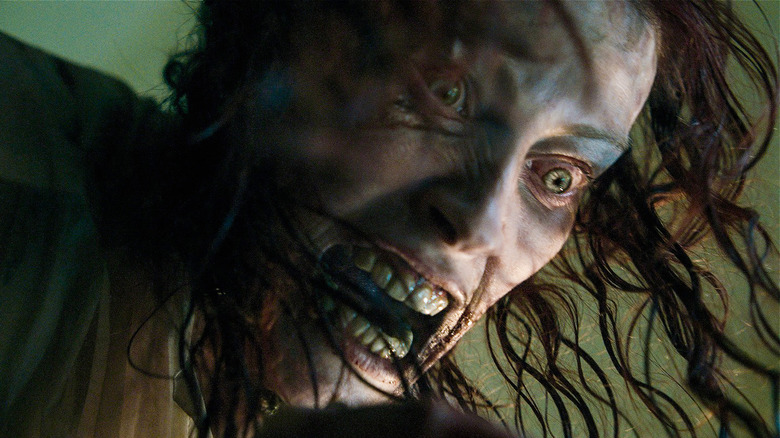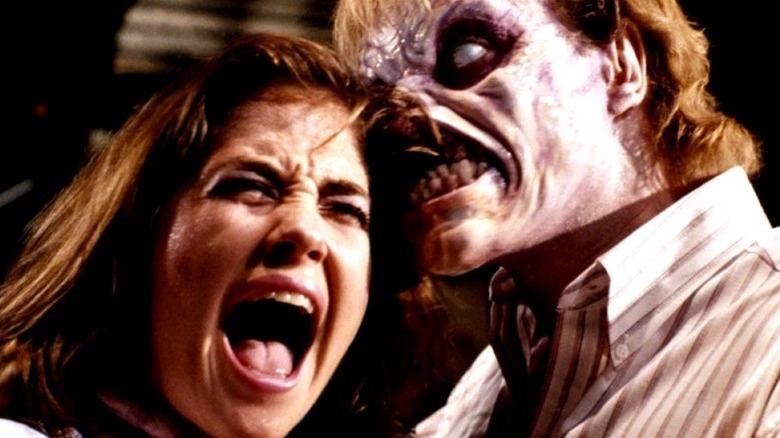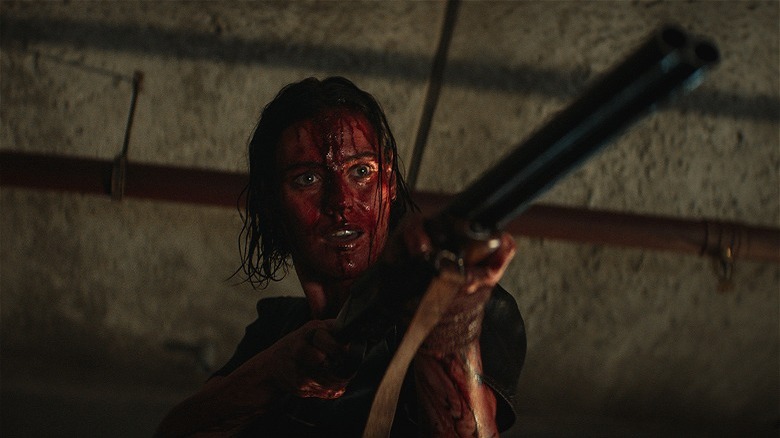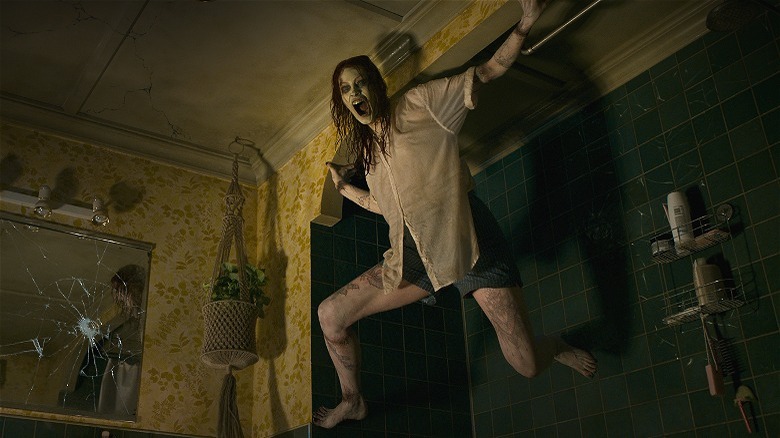Evil Dead Rise Turns The Tables For The Women Of The Franchise – And It's About Time
This post contains spoilers for Lee Cronin's "Evil Dead Rise."
The "Evil Dead" franchise epitomized the cabin in the woods horror trope in visceral and uncompromising ways. When Lee Cronin decided to craft a fresh, equally demented installment to keep the franchise going, he shifted the setting to a cramped L.A. apartment where a family unit experience horrors beyond their imagination. Apart from this marked shift in focus, Cronin's latest installment puts women under the spotlight by letting them be as emotionally complex and frighteningly scary as possible, with a story that puts these characters directly in the heart of gory mayhem.
Cronin's decision to veer in a fresh direction leads to a gripping apartment horror with a family forced to tear one another apart. Although the film relies on established franchise tropes, including tapes that spell out demon-summoning incantations and standard Deadite behavior, "Evil Dead Rise" situates powerful women in an extreme death match. Alyssa Sutherland, who plays Ellie, also told AP about her experience of playing a possessed woman who subverts the ideas of domesticity and motherhood after her turn:
"To see a really horrific woman and play a horrific woman on screen, that was wonderful ... I would love to say that it was a real struggle to get to that place but I recognized that I am a little bit of a former people pleaser, and I had a lot of unexpressed rage and I just tapped into that."
What makes Sutherland's Ellie so terrifying is the incredible range she is allowed to display. A Deadite who won't stop till everyone is dead, Ellie mocks, coos, and manipulates her way throughout while viciously tearing off flesh and contorting in inhuman ways. Has the franchise ever featured a character like hers?
Uneven, often misogynistic portrayals
As a whole, the "Evil Dead" franchise has mostly unfolded through the point-of-view of Ash Williams (Bruce Campbell), whose arc from an empathetic, traumatized young man to a hardened survivalist paints him as an unconventional final dude in the history of horror. Although Ash's story is intriguing in itself, it's come at the cost of the women in the franchise, who are mostly present to be defiled, hacked into, and discarded.
The infamous "tree assault" scene in "The Evil Dead" has obviously aged terribly, and the first film does not grant much agency to its female characters, outside of them holding emotional leverage over Ash's internal turmoil of being forced to kill the people he loves. The sequel does more of the same, with the exception of Annie (Sarah Berry) successfully opening the portal, although she dies shortly after. While "Army of Darkness" completely changes its setting to Medieval times, Shiela (Embeth Davidtz) only fulfills the traditional role of Ash's love interest who needs to be redeemed after she is literally "defiled."
This trend of women being used for emotional leverage or shock value was bucked massively in the beautifully gory 2013 reboot, where Mia (Jane Levy) amounts to more than a possessed woman meant to terrify. Her character has layers — she's an addict who wishes to recover, and this aspect plays heavily into the events of the film. Moreover, Mia subverts established conventions in the end, becoming the one to snatch back her autonomy by defeating the Abomination (in a rather gnarly, badass way by slicing it in half with a chainsaw). Although Mia is also assaulted during her turn in a rather graphic way, the ending prevents the incident from defining her fate as a tragic, doomed character in the world of "Evil Dead."
Flipping the script
The cast of "Evil Dead Rise" are predominantly women, with Ellie and Beth (Lilly Sullivan) battling it out inside an L.A. high-rise, and two out of the three children become possessed by nefarious entities. Even before all hell breaks loose, Ellie and Beth are allowed to marinate in their messiness and complexities, where the two air out their grievances and offer glimpses into their emotional cores. A chunk of these internal anxieties and fears manifest when evil is unleashed, and Ellie hunts and torments her family in a way that's unsettling because the conventions of family and womanhood are turned on its head.
Sutherland told the New York Post that it was exciting to play an empowered role where a woman was allowed to be "bad" without being punished in misogynistic ways:
"To be a really bad, bad, bad, bad, mother — I was so excited to do that. The possession scene, there's a different take on it. We're not dealing with a woman who was raped by a tree. I was happy with that."
Beth, on the other hand, is a free-spirited musician who has dealt with sexism all her life, and now that she's unexpectedly pregnant, her deep-seated fears of assuming this role lends directly to some of the most terrifying scenes in the film. Every Beth vs. Ellie scene is loaded with these subtexts, where two sisters who once held love for one another are now looking to kill, for different reasons. Female rage also manifests in the possession scenes where Bridget (Gabrielle Echols) uses a cheesegrater to scrape the skin off her aunt's limbs, taunting her along with Ellie that she will never be a good mother. Beth, however, proves them wrong by protecting Kassie in the end, while single-handedly defeating the dreadful Deadite final boss for good.
Small, but seminal steps in the right direction
It would be incorrect to state that only Fede Álvarez and Cronin's installments have worked towards leveling the playing field for its female characters, as the "Ash vs. The Evil Dead" series also features strong, self-sufficient female characters of various moral temperaments, like Kelly Maxwell (Dana DeLorenzo) and Ruby Knowby (Lucy Lawless). While Campbell's Ash is still the primary protagonist, these women are compelling protagonists and antagonists in their own right, with some fighting alongside Ash to skillfully defeat superpowered entities.
However, Cronin establishes that female characters, especially in a domestic, familial setting, do not need to embody conventional heroic qualities to be deemed "worthy" of survival. No gratuitous assault scenes are required to denote possession, as a wealth of gnarly imagery can be etched together to present a picture of terror. There's plenty of hyper-violence present: sharp scissors are stabbed into nostrils, throats are ripped out, and body horror is employed in gruesome ways to evoke an environment of pure fear and claustrophobia. Moreover, Ellie and Beth do not have to fulfill traditionally "feminine" roles — if anything, the fun lies in the subversion, where survival often demands cruel acts and characters can shape their own idea of justice.
"Evil Dead Rise" allows women to take center stage and shape the landscape of demented horrors with existential fears about traditional female roles and the anxieties it evokes. There are throughlines of emotional baggage, familial expectations, and difficult choices, where women can be both empathetic and a force to be reckoned with (which includes being a terrifying demonic force). It's about time that the franchise explicitly did that, and this will hopefully be second nature in the gnarly sequels to come.
"Evil Dead Rise" is currently in theaters.



